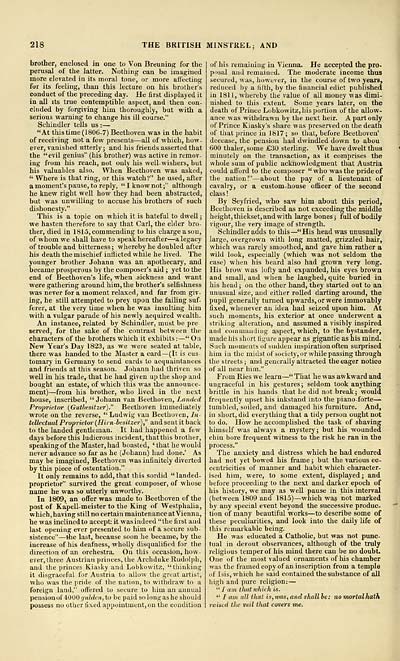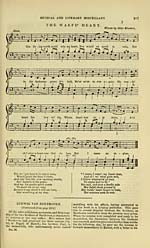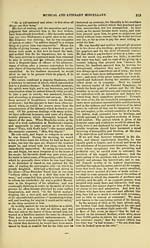Glen Collection of printed music > Printed music > British minstrel, and musical and literary miscellany
(226) Page 218
Download files
Complete book:
Individual page:
Thumbnail gallery: Grid view | List view

218
THE BRITISH MINSTREL; AND
brother, enclosed in one to Von Dreuning for the
perusal of the latter. Nothing can be imagined
more elevated in its moral tone, or more affecting
for its feeling, than this lecture on his brother's
conduct of the preceding day. He first displayed it
in all Its true contemptible aspect, and then con-
cluded by forgiving him thoroughly, but with a
serious warning to change his ill course."
Schindler tells us : —
"At this time (1806-7) Beethoven was in the habit
of receiving not a few presents — all of which, how-
ever, vanished utterly; and his friends asserted that
the "evil genius" (his brother) was active in remov-
ing from his reach, not only his well-wishers, but
his valuables also. When Beethoven was asked,
" Where is that ring, or this watch?" he used, alter
a moment's pause, to reply, "I know not;" although
he knew right well how they had been abstracted,
but was unwilling to accuse his brothers of such
dishonesty."
This is a topic on which it is hateful to dwell ;
we hasten therefore to say that Carl, the elder bro-
ther, died in 1815, commending to his chargeason,
of whom we shall have to speak hereafter — a legacy
of trouble and bitterness ; whereby he doubled after
his death the mischief inflicted while he lived. The
younger brother Johann was an apothecary, and
became prosperous by the composer's aid ; yet to the
end of Beethoven's life, when sickness and want
were gathering arovmd him, the brother's selfishness
was never for a moment relaxed, and far from giv-
ing, he still attempted to prey upon the failing suf-
ferer, at the very time when he was insulting him
with a vulgar parade of his newly acquired wealth.
An instance, related by Schindler, must be pre
served, for the sake of the contrast between the
characters of the brothers which it exhibits : — " On
New Year's Day 1823, as we were seated at table,
there was handed to the Master a card — (It is cus-
tomary in Germany to send cards to acquaintances
and friends at this season. Johann had thriven so
well in his trade, that he had given up the shop and
bought an estate, of which this was the announce-
ment) — from his brother, who lived in the next
house, inscribed, " Johann van Beethoven, Landed
Proprietor {Guthesitzer)." Beethoven immediately
wrote on the reverse, " Ludwig van Beethoven, In-
tellectual Proprietor {Hirnbesitzer)^' and sent it back
to the landed gentleman. It had happened a few
days before this ludicrous incident, that this brother,
speaking of the Master, had boasted, ' that he would
never advance so far as he (Johann) had done.' As
may be imagined, Beethoven was infinitely diverted
by this piece of ostentation."
It only remains to add, that this sordid " landed-
proprietor" survived the great composer, of whose
name he was so utterly unworthy.
In 1809, an offer was made to Beethoven of the
post of Ka'pell-meister to the King of Westphalia,
which, having still no certain maintenance at Vienna,
he was inclined to accept it was indeed "the first and
la.st opening ever presented to him of a secure sub-
sistence" — the last, because soon he became, by the
increase of bis deafness, wholly disqualified for the
direction of an orchestra. On this occasion, how-
ever, three Austrian princes, the Archduke Rudolph,
and the princes Kiasky and Lobkowitz, "tliinking
it disgraceful for Austria to allow the great artist,
who was the pride of the nation, to withdraw to a
foreign land," ofl'ered to secure to him an annual
pensionof40U0(/((WcM,to be paid solongasheshould
possess no other fixed appointment, on the condition
of his remaining in Vienna. He accepted the pro-
pcisal and remained. The moderate income thus
secured, was, however, in the course of two years,
reduced by a filth, by the financial edict published
in 1811, whereby the value of all money was dimi-
nished to this extent. Some years later, on the
death of Prince Lobkowitz, his portion of the allow-
ance was withdrawn by the next heir. A part only
of Prince Kiasky's share was preserved on the death
of that prince in 1817; so that, before Beethoven'
decease, the pension had dwindled down to abou
600 thaler, some £30 sterling. We have dwelt thus
minutely on the transaction, as it comprises the
whole sum of public acknowledgment that Austria
could afl'ord to the composer " who was the pride of
the nation!" — about the pay of a lieutenant of
cavalry, or a custom-house officer of the second
class !
By Seyfried, who saw him about this period,
Beethoven is described as not exceeding the middle
height, thickset, and with large bones ; full of bodily
vigour, the very image of strength.
Schindler adds to this — "His head was unusually
large, overgrown with long matted, grizzled hair,
which was rarely smoothed, and gave him rather a
wild look, especially (which was not seldom the
case) when his beard also had grown very long.
His brow was lofty and expanded, his eyes brown
and small, and when he laughed, quite buried in
his head ; on the other hand, they started out to an
unusual size, and either rolled darting around, the
pupil generally turned upwards, or were immovably
fixed, whenever an idea had seized upon him. At
such moments, his exterior at once underwent a
striking alteration, and assumed a visibly inspired
and connnaudiiig aspect, which, to the bystander,
made his short figure appear as gigantic as his mind.
Such moments of sudden inspiration often surprised
him iu the midst of society, or while passing through
the streets; and generally attracted the eager notice
of all near him."
FromRieswe learn — "That he was awkward and
ungraceful in his gestures; seldom took anything
brittle in his hands that he did not break ; would
frequently upset his inkstand into the piano-forte —
tumbled, soiled, and damaged his furniture. And,
in short, did everything that a tidy person ought not
to do. How he accomplished the task of shaving
himself was always a mystery; but his wounded
chin bore frequent witness to the risk he ran in the
process."
The anxiety and distress which he had endured
had not yet bowed his frame ; but the various ec-
centricities of manner and habit which character-
ised him, were, to some extent, displayed; and
before proceeding to the next and darker epoch of
his history, we may as well pause in this interval
(between 1809 and 1815) — which was not marked
by any special event beyond the successive produc-
tion of many beautiful works — to describe some of
these peculiarities, and look into the daily life of
this remarkable being.
He was educated a Catholic, but was not punc-
tual in devout observances, although of the tndy
religious temper of his mind there can be no doubt.
One of the most valued ornaments of his chamber
was the framed copy of an inscription from a temple
of Isis, which he said contained the substance of all
high and pure religion: —
" / am that which is.
" / am all that is,mas, and shall be: notnortalhath
raised the veil that covers me.
THE BRITISH MINSTREL; AND
brother, enclosed in one to Von Dreuning for the
perusal of the latter. Nothing can be imagined
more elevated in its moral tone, or more affecting
for its feeling, than this lecture on his brother's
conduct of the preceding day. He first displayed it
in all Its true contemptible aspect, and then con-
cluded by forgiving him thoroughly, but with a
serious warning to change his ill course."
Schindler tells us : —
"At this time (1806-7) Beethoven was in the habit
of receiving not a few presents — all of which, how-
ever, vanished utterly; and his friends asserted that
the "evil genius" (his brother) was active in remov-
ing from his reach, not only his well-wishers, but
his valuables also. When Beethoven was asked,
" Where is that ring, or this watch?" he used, alter
a moment's pause, to reply, "I know not;" although
he knew right well how they had been abstracted,
but was unwilling to accuse his brothers of such
dishonesty."
This is a topic on which it is hateful to dwell ;
we hasten therefore to say that Carl, the elder bro-
ther, died in 1815, commending to his chargeason,
of whom we shall have to speak hereafter — a legacy
of trouble and bitterness ; whereby he doubled after
his death the mischief inflicted while he lived. The
younger brother Johann was an apothecary, and
became prosperous by the composer's aid ; yet to the
end of Beethoven's life, when sickness and want
were gathering arovmd him, the brother's selfishness
was never for a moment relaxed, and far from giv-
ing, he still attempted to prey upon the failing suf-
ferer, at the very time when he was insulting him
with a vulgar parade of his newly acquired wealth.
An instance, related by Schindler, must be pre
served, for the sake of the contrast between the
characters of the brothers which it exhibits : — " On
New Year's Day 1823, as we were seated at table,
there was handed to the Master a card — (It is cus-
tomary in Germany to send cards to acquaintances
and friends at this season. Johann had thriven so
well in his trade, that he had given up the shop and
bought an estate, of which this was the announce-
ment) — from his brother, who lived in the next
house, inscribed, " Johann van Beethoven, Landed
Proprietor {Guthesitzer)." Beethoven immediately
wrote on the reverse, " Ludwig van Beethoven, In-
tellectual Proprietor {Hirnbesitzer)^' and sent it back
to the landed gentleman. It had happened a few
days before this ludicrous incident, that this brother,
speaking of the Master, had boasted, ' that he would
never advance so far as he (Johann) had done.' As
may be imagined, Beethoven was infinitely diverted
by this piece of ostentation."
It only remains to add, that this sordid " landed-
proprietor" survived the great composer, of whose
name he was so utterly unworthy.
In 1809, an offer was made to Beethoven of the
post of Ka'pell-meister to the King of Westphalia,
which, having still no certain maintenance at Vienna,
he was inclined to accept it was indeed "the first and
la.st opening ever presented to him of a secure sub-
sistence" — the last, because soon he became, by the
increase of bis deafness, wholly disqualified for the
direction of an orchestra. On this occasion, how-
ever, three Austrian princes, the Archduke Rudolph,
and the princes Kiasky and Lobkowitz, "tliinking
it disgraceful for Austria to allow the great artist,
who was the pride of the nation, to withdraw to a
foreign land," ofl'ered to secure to him an annual
pensionof40U0(/((WcM,to be paid solongasheshould
possess no other fixed appointment, on the condition
of his remaining in Vienna. He accepted the pro-
pcisal and remained. The moderate income thus
secured, was, however, in the course of two years,
reduced by a filth, by the financial edict published
in 1811, whereby the value of all money was dimi-
nished to this extent. Some years later, on the
death of Prince Lobkowitz, his portion of the allow-
ance was withdrawn by the next heir. A part only
of Prince Kiasky's share was preserved on the death
of that prince in 1817; so that, before Beethoven'
decease, the pension had dwindled down to abou
600 thaler, some £30 sterling. We have dwelt thus
minutely on the transaction, as it comprises the
whole sum of public acknowledgment that Austria
could afl'ord to the composer " who was the pride of
the nation!" — about the pay of a lieutenant of
cavalry, or a custom-house officer of the second
class !
By Seyfried, who saw him about this period,
Beethoven is described as not exceeding the middle
height, thickset, and with large bones ; full of bodily
vigour, the very image of strength.
Schindler adds to this — "His head was unusually
large, overgrown with long matted, grizzled hair,
which was rarely smoothed, and gave him rather a
wild look, especially (which was not seldom the
case) when his beard also had grown very long.
His brow was lofty and expanded, his eyes brown
and small, and when he laughed, quite buried in
his head ; on the other hand, they started out to an
unusual size, and either rolled darting around, the
pupil generally turned upwards, or were immovably
fixed, whenever an idea had seized upon him. At
such moments, his exterior at once underwent a
striking alteration, and assumed a visibly inspired
and connnaudiiig aspect, which, to the bystander,
made his short figure appear as gigantic as his mind.
Such moments of sudden inspiration often surprised
him iu the midst of society, or while passing through
the streets; and generally attracted the eager notice
of all near him."
FromRieswe learn — "That he was awkward and
ungraceful in his gestures; seldom took anything
brittle in his hands that he did not break ; would
frequently upset his inkstand into the piano-forte —
tumbled, soiled, and damaged his furniture. And,
in short, did everything that a tidy person ought not
to do. How he accomplished the task of shaving
himself was always a mystery; but his wounded
chin bore frequent witness to the risk he ran in the
process."
The anxiety and distress which he had endured
had not yet bowed his frame ; but the various ec-
centricities of manner and habit which character-
ised him, were, to some extent, displayed; and
before proceeding to the next and darker epoch of
his history, we may as well pause in this interval
(between 1809 and 1815) — which was not marked
by any special event beyond the successive produc-
tion of many beautiful works — to describe some of
these peculiarities, and look into the daily life of
this remarkable being.
He was educated a Catholic, but was not punc-
tual in devout observances, although of the tndy
religious temper of his mind there can be no doubt.
One of the most valued ornaments of his chamber
was the framed copy of an inscription from a temple
of Isis, which he said contained the substance of all
high and pure religion: —
" / am that which is.
" / am all that is,mas, and shall be: notnortalhath
raised the veil that covers me.
Set display mode to: Large image | Transcription
Images and transcriptions on this page, including medium image downloads, may be used under the Creative Commons Attribution 4.0 International Licence unless otherwise stated. ![]()
| Special collections of printed music > Glen Collection of printed music > Printed music > British minstrel, and musical and literary miscellany > (226) Page 218 |
|---|
| Permanent URL | https://digital.nls.uk/91437657 |
|---|
| Description | Scottish songs and music of the 18th and early 19th centuries, including music for the Highland bagpipe. These are selected items from the collection of John Glen (1833 to 1904). Also includes a few manuscripts, some treatises, and other books on the subject. |
|---|
| Description | The Glen Collection and the Inglis Collection represent mainly 18th and 19th century Scottish music, including Scottish songs. The collections of Berlioz and Verdi collected by bibliographer Cecil Hopkinson contain contemporary and later editions of the works of the two composers Berlioz and Verdi. |
|---|

